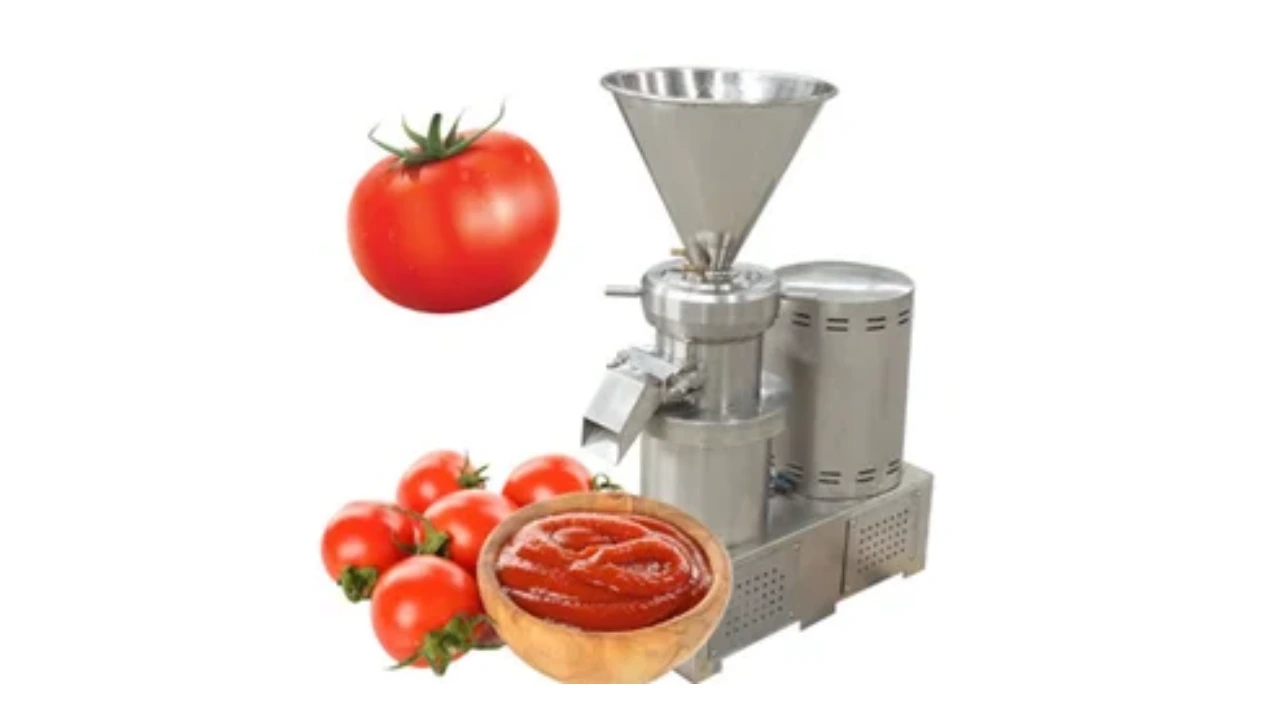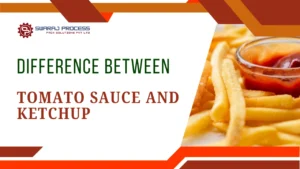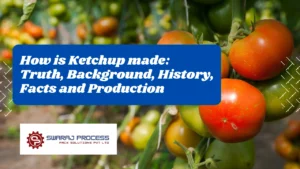Ketchup is one of the most popular condiments in the world, widely used with snacks, fast food, and meals across homes, restaurants, and food chains. While it looks simple on the plate, the industrial process of making ketchup in a factory involves precise steps, strict quality control, and advanced food processing machinery. In this blog, we will explore how ketchup is made in a factory, from fresh tomatoes to the final packaged bottle, and also highlight the role of Swaraj Process Pack, a tomato sauce and ketchup making machine manufacturer, in supporting modern production lines.
Process of Tomato Ketchup Making
1. Selection of Raw Tomatoes
The Sauce manufacturing process begins with the careful selection of tomatoes. Factories typically use ripe, red, and high-solid tomatoes, as they provide better color, flavor, and consistency. Tomatoes are sourced directly from farms or suppliers and transported to the factory in bulk.
Quality checks are performed at this stage to remove damaged, unripe, or spoiled tomatoes. Only fresh and healthy tomatoes move forward in the process, ensuring the final ketchup has a rich taste and appealing appearance.
2. Washing and Sorting
Once received, tomatoes are thoroughly washed to remove dirt, dust, pesticides, and other impurities. This step is usually done using automatic tomato washing machines, which use clean water sprays and rotating drums.
After washing, tomatoes pass through a sorting line where defective fruits are removed manually or using optical sorting systems. Proper washing and sorting are critical for food safety and maintaining hygiene standards in large-scale ketchup production.
3. Crushing and Pulping
The cleaned tomatoes are then sent to a crusher or pulper machine. Here, tomatoes are crushed to break the skin and release juice and pulp. Seeds and skins are separated during this process, resulting in smooth tomato pulp.
This pulp forms the base of ketchup and tomato sauce. Modern factories use stainless steel pulping machines to ensure hygiene, durability, and uniform texture.
4. Cooking and Concentration
The tomato pulp is transferred to steam-heated cooking kettles or vacuum evaporators, where it is cooked at controlled temperatures. Cooking helps in:
- Reducing moisture content
- Enhancing color and flavor
- Increasing thickness and viscosity
Vacuum cooking is often preferred in modern factories because it preserves natural color and taste while reducing cooking time. The pulp is concentrated into tomato paste, which is a key ingredient in ketchup production.
5. Addition of Ingredients
Once the tomato paste reaches the desired consistency, other ingredients are added according to the recipe. These typically include:
- Sugar or sweeteners
- Salt
- Vinegar
- Spices and seasonings (such as onion powder, garlic, and natural flavors)
All ingredients are carefully measured and mixed to maintain consistent taste across batches. Industrial mixing and blending machines ensure uniform distribution of spices and flavors throughout the sauce.
6. Blending and Homogenization
After adding ingredients, the mixture is blended thoroughly. Homogenization is an important step that improves texture, smoothness, and stability. It prevents separation of liquids and solids during storage.
Advanced ketchup manufacturing plants use high-speed mixers and homogenizers to achieve the perfect thickness and glossy appearance consumers expect from quality Sauce.
7. Pasteurization
To ensure food safety and extend shelf life, the ketchup is pasteurized. This process involves heating the product to a specific temperature for a set time to kill harmful microorganisms.
Pasteurization is essential for maintaining freshness without using excessive preservatives. It also ensures that the ketchup remains safe for long-term storage and transportation.
8. Filling and Bottling
After pasteurization, the hot ketchup is transferred to automatic filling machines. These machines fill the ketchup into bottles, pouches, or sachets with high accuracy and minimal wastage.
The containers are immediately sealed using capping or sealing machines to prevent contamination. Modern factories often use automated lines for:
- Bottle filling
- Cap sealing
- Labeling
- Batch coding
This automation ensures high production speed and consistent packaging quality.
9. Cooling, Labeling, and Packaging
Once sealed, bottles are cooled gradually to prevent thermal shock. After cooling, labels are applied with product details such as brand name, ingredients, manufacturing date, and expiry date.
The labeled bottles are then packed into cartons or boxes for storage and distribution. Final quality inspections are conducted before dispatch to the market.
10. Quality Control and Testing
Throughout the manufacturing process, strict quality control checks are performed. These include:
- Taste and flavor testing
- Color and texture analysis
- pH level checks
- Microbiological testing
Quality assurance ensures that every batch meets food safety standards and delivers consistent taste to consumers.
Role of Swaraj Process Pack in Ketchup Manufacturing
Efficient ketchup production depends heavily on reliable machinery and well-designed processing lines. Swaraj Process Pack, a trusted tomato sauce making machine manufacturer, plays an important role in supporting food processing industries.
We offers:
- Tomato washing and pulping machines
- Cooking kettles and sauce processing systems
- Mixing and blending equipment
- Automatic filling and packaging solutions
Our machines are designed for high efficiency, hygienic operation, and long service life, making them suitable for small-scale, medium, and large ketchup manufacturing units. With customized solutions and robust engineering, Swaraj Process Pack helps manufacturers achieve consistent quality and higher productivity.
Conclusion
The factory manufacturing of ketchup is a well-organized process that combines fresh ingredients, precise cooking, and advanced machinery. From tomato selection to final packaging, every step is carefully controlled to deliver a flavorful, safe, and high-quality product.
With the support of reliable equipment providers like Swaraj Process Pack, a tomato sauce and ketchup making machine manufacturer, food processing companies can streamline production, maintain hygiene standards, and meet growing market demand. As consumer preferences continue to rise for quality and consistency, modern ketchup manufacturing technology plays a crucial role in shaping the future of the food industry.





